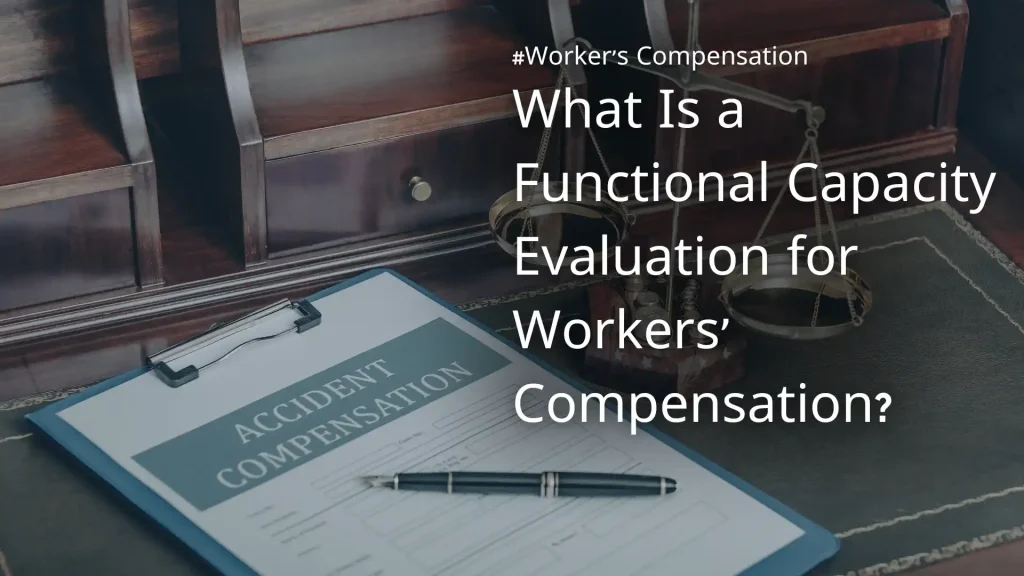Posted on Friday, November 8th, 2024 at 9:00 am

A functional capacity evaluation (FCE) can play an important role in Georgia workers’ compensation cases. This medical assessment measures an injured worker’s physical abilities to determine whether they can safely return to their job. In many cases, the FCE results impact the benefits an employee may qualify for and the type of work they can perform. If you’re preparing to file a workers’ comp claim, understanding what to expect from a functional capacity evaluation for workers’ compensation and how it could affect your claim can help you make informed decisions as you recover.
What Is a Functional Capacity Evaluation?
An FCE assesses a worker’s physical abilities and limitations following a job-related injury. This evaluation helps determine whether they can return to their previous role or require adjustments based on their current physical condition. Health care providers, typically physical therapists, conduct FCEs in clinical settings. They observe and test a worker’s performance on tasks that mirror the demands of their actual job.
In workers’ compensation cases, FCEs provide objective data about an employee’s physical condition. This data can support or dispute a claim for benefits. By identifying specific strengths and weaknesses, an FCE can guide decisions about an employee’s potential for safe job performance or the need for alternative work options.
When Do You Need a Functional Capacity Evaluation?
An FCE is typically necessary in workers’ compensation cases when there is uncertainty about an injured worker’s ability to return to their job. A worker may require an FCE after they’ve reached maximum medical improvement (MMI). They may also need an FCE when a dispute arises regarding the severity of their injury or the extent of their physical limitations.
Your employer or their insurance company may request an FCE to determine whether you can resume your duties or if you require job modifications before you can return to work. Additionally, if you’re unable to return to your previous position, the results of the FCE can help determine your eligibility for ongoing benefits or vocational rehabilitation. In some cases, the FCE may also assist in settling disputes over compensation amounts.
What Does a Functional Capacity Evaluation Involve?
In Georgia workers’ comp cases, an FCE typically involves a series of physical tests and assessments. These are designed to measure a worker’s strength, flexibility, endurance, and ability to perform job-related tasks.
The process starts with a review of the worker’s medical history and injury details. Next comes a series of physical tasks that may include lifting, bending, standing, walking, or carrying objects. These tasks are meant to simulate the demands of the worker’s job and assess how their body responds.
The evaluation usually includes objective measurements, such as how much weight the worker can lift or how far they can walk. It also incorporates subjective observations, such as their pain levels and fatigue. The health care provider performing the FCE will closely monitor the worker’s movements, noting any signs of discomfort, pain, or limitations.
FCEs often also incorporate standardized tests to ensure consistency and accuracy. These tests help quantify the worker’s physical capacity compared to what their job requires. The provider then compiles the results of the FCE into a report that outlines the worker’s functional abilities and limitations. This report can be used by employers, insurance companies, and Georgia workers’ comp attorneys to make informed decisions about a workers’ compensation claim.
How Does an FCE Affect Your Workers’ Compensation Claim?

The results of your FEC can have a significant impact on your workers’ compensation claim. If it shows that you can perform certain tasks or return to work with minimal restrictions, it may lead to a reduction in your benefits or the end of temporary disability payments. On the other hand, the FCE may reveal that you can’t resume your previous job or perform specific tasks due to physical limitations. In this case, you may be entitled to ongoing benefits, including permanent disability payments.
In addition, the FCE can play a role in determining whether you require vocational rehabilitation. If you can’t return to your previous position, the evaluation may help identify other suitable employment opportunities and guide your training or job modification efforts. The results may also factor into settlement negotiations, providing a clearer picture of your current and future capabilities.
Contact an Atlanta Workers’ Compensation Attorney to Learn More
If you’re facing a workers’ compensation claim and need a functional capacity evaluation, it’s important to understand how the results could affect your benefits and your options for returning to work. Jonathan R. Brockman, P.C. has more than three decades of experience helping injured Georgia workers access the benefits they deserve. Contact our team today at 770-205-8887 to learn more about how we can guide you through the process and protect your rights.
